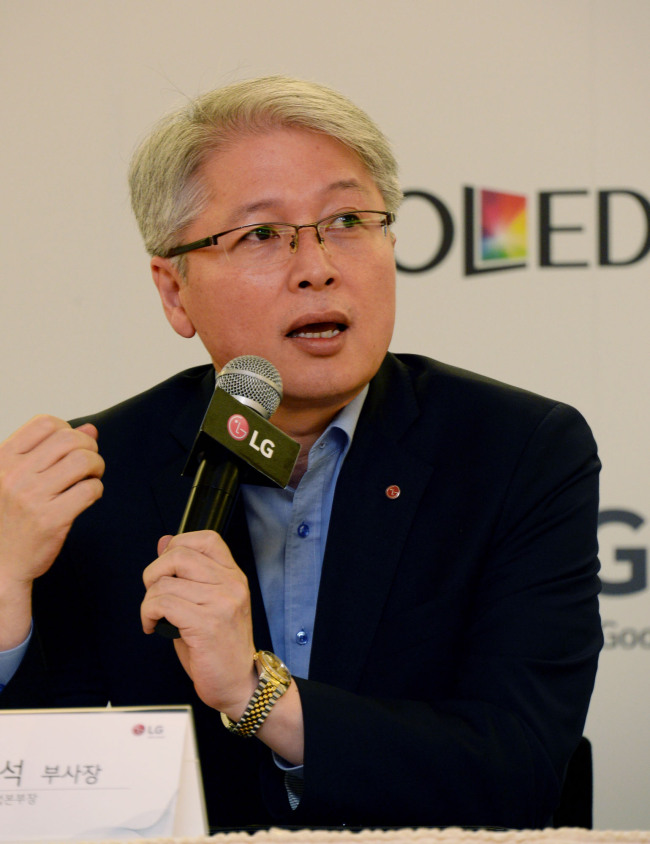 |
LG Electronics’ head of home entertainment division Kwon Bong-suk. LG Electronics |
BERLIN ― LG Electronics on Friday hinted at selling some 500,000 organic light-emitting display, or OLED, TVs this year, almost a fivefold increase from last year, largely buoyed by recent consumer demand and improved panel yield rate.
The Korean tech giant was the sole producer of OLED TVs last year. But this year, the market is showing some signs of booming, with Chinese and Japanese TV makers joining the bandwagon.
“Consumer demand is rising,” said Kwon Bong-suk, head of LG’s home entertainment division, at a news conference on the sidelines of the IFA electronics trade show in Berlin.
“Prices would be lowered as we are ramping up efforts to increase the yield rate of panels.”
LG, along with its sister firm LG Display, has poured resources into the nascent but lucrative OLED market in recent years, while other TV makers still stick to producing liquid-crystal displays, or LCDs, for better profits.
OLED doesn’t require a backlight because the pixels in the screen can be individually switched on or off, resulting in almost infinite contrast levels and high light output. That also allows lighter and thinner designs than LCDs.
But the panels remain expansive and challenging to build, increasing product prices overall.
“We could reduce the price gap (from the LCD counterparts) from the current some 50 percent to 20 to 30 percent next year,” said the TV chief of LG.
At the IFA show, LG adorned the entrance of its largest-ever 3,799-square-meter exhibition hall with 64 OLED TVs. The walls were painted black for more dramatic expression of OLED’s perfect blackness and color contrast.
The company also showcased the world’s first high-dynamic range, or HDR, OLED TV with aims to launch the models in the latter half of this year.
HDR is widely seen as the next generation of home video content after 4K. The 4K offers four times the resolution of high-definition televisions. HDR offers even better contrast, even though the standards are still being worked out.
LG has teamed up with video streaming services such as Amazon and Netflix and broadcasting stations like the U.K.’s BBC in the belief that content should be supported to really take advantage of HDR.
“HDR is best realized on OLED because OLED delivers perfect black,” said the LG TV chief.
“We will continue efforts to help consumers better understand the real virtues of OLED TVs.”
He also forecast the company’s sluggish TV earnings would improve in the third quarter and turn to profitability within the year. He added sales of its LCD-based Ultra HD TVs have tripled this year.
“We expect a modest growth both in total TV sales and market share this year,” he said.
By Lee Ji-yoon, Korea Herald correspondent (
jylee@heraldcorp.com)








![[Weekender] Korea's traditional sauce culture gains global recognition](http://res.heraldm.com/phpwas/restmb_idxmake.php?idx=644&simg=/content/image/2024/11/21/20241121050153_0.jpg)